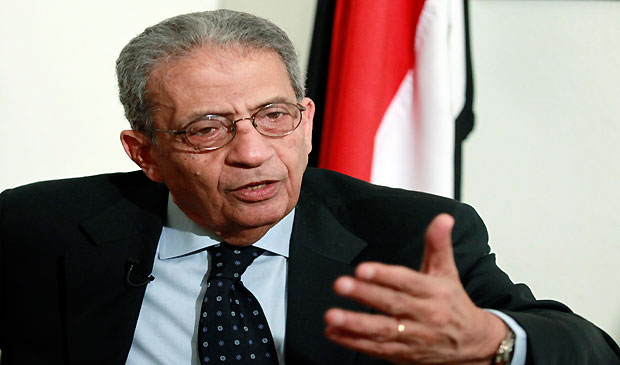
File photo of Amr Moussa. (Reuters/Mohamed Abd El Ghany)
Cairo, Asharq Al-Awsat—Egypt’s political parties are capable of forming a strong and effective parliament following elections later this year, veteran Egyptian politician Amr Moussa said. His comments come after the passage of a controversial parliamentary election law by an outgoing interim president and the election of a new president in Egypt.
Speaking to Asharq Al-Awsat, the former Egyptian foreign minister and Arab League chief, said: “The formation of a strong parliament requires political work on the ground to put forward principles and commitments and mobilize supporters. All the parties have the opportunity to correct their presence on the Egyptian scene during the forthcoming parliamentary elections.”
Outgoing interim president Adly Mansour signed into law a controversial parliamentary election bill in his final days in office. The election law sees the number of seats in Egypt’s House of Representatives decrease from 630 to 567. Of these seats, 420 will be elected via an individual candidacy system while as many as 120 seats will be reserved for party lists. Egypt’s president will also be able to appoint lawmakers to up to 27 seats—that is, 5 percent of the parliament—in accordance with the constitution.
Moussa said he agreed with the election law, particularly the decision to lower the number of seats. “The presence of more than 600 lawmakers ultimately hampered parliament’s operations, and parliament was unable to discuss all the issues. This is why I said that a parliament with this number of lawmakers would be nothing more than a political demonstration and not a place for legislation. I spoke about this with interim president Adly Mansour, the prime minister and others, and confirmed to them this number would not work.”
“I think it is important to reduce the number of seats so that lawmakers can sit together in parliament and read and discuss and amend legislation in a way that is convenient and allows for in-depth debate,” he added.
“The parties that are present can form a parliament, as for the strength or weakness of this parliament, this requires discussion. The parties that are present are fragile because the policies of former governments were based on weakening political parties,” he said.
The veteran Egyptian politician said that he is calling for a general “bringing together” of political parties behind the new government. “This ‘bringing together’ that I am calling for and working to achieve is [aimed at] bringing closer parties whose interests are served by the success of the president, the new government, the new era, and the third republic.”
“Everyone can get behind the national interest,” he added.
Moussa also said the Egyptian people had a “responsibility” to get behind the country’s new president, Abdel-Fattah El-Sisi, and the transitional road map put forward following the ouster of former president Mohamed Mursi in July 2013, a road map which will be completed with the election of Egypt’s parliament. “The people must take part in the construction and development of the state,” he said.
As for those who oppose the road map and are operating outside of the constitution, Moussa said: “We must put forward a plan which is being developed by the government to deal with this. Action is needed, and this is action under the supervision of ministries and the security apparatus.”
Moussa said the now-outlawed Muslim Brotherhood continues to represent a threat to the Egyptian state, including from abroad, and he warned the Islamist group against continuing such efforts. “For every action there is a reaction . . . and the Egyptian reaction could be far harsher than the original action. The Egyptian state is heading resolutely towards the future, and we cannot accept any infiltration of the state.”
“What happened over the past three years was enough, not to mention the psychological repercussions of this on the Egyptian people,” he added.
